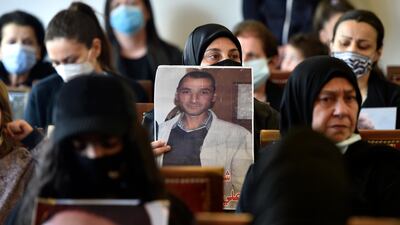Around one hundred women, including mothers, demonstrated in crisis-hit Lebanon on Saturday on the eve of Mother's Day in the country, expressing outrage at the ruling class.
The women marched from an area once on Beirut's dividing line during the 1975-1990 civil war, to the city's port, which saw a catastrophic explosion last year – blamed on official negligence – that killed more than 200 people and injured thousands.
Many of them were wearing black, and some carried banners denouncing Lebanon's political class, which they accuse of corruption and negligence that led to the explosion, as well as the country's worst economic crisis in its modern history.
“The scream of every mother is leave,” read one of the banners carried by the protesters, referring to the country’s ruling political elites.
"You have stolen our money and our children's futures," several placards read.
“We raised them inch by inch and you blew them up. Leave!” read another banner. Mothers’ Day is widely celebrated in Lebanon, with people visiting their mothers and giving them gifts.
"The best gift would be your leaving," read another.
Nearly 3,000 tonnes of poorly stored ammonium nitrate, a highly explosive fertiliser component, exploded on August 4 at Beirut’s port, killing 211, wounding more than 6,000 and damaging entire neighbourhoods in the capital. The material had been stored at the port for more than six years.
The explosion, one of the largest non-nuclear blasts in history, and the spread of coronavirus have worsened Lebanon’s economic crisis. Since the crisis began in October 2019, thousands of young men and women have left the country seeking jobs.
The national currency has lost almost 90 per cent of its value against the dollar on the black market and consumer prices have soared.
Some 55 per cent of Lebanese now live below the poverty line, the United Nations says, and unemployment stood at 39.5 per cent late last year.
The government resigned after the port explosion, but endless haggling between the main ruling parties has delayed the process of forming a new Cabinet.
"They are all war criminals, warlords," protester Nada Agha told AFP, referring to the fact that several politicians were militia leaders during the civil war.
"They have been dividing up the pie among themselves … and have blown us up and stolen our money. We want them to leave!" she said.
Another demonstrator, Petra Saliba, in her fifties, said "no solution is possible while they are in power".
"We want to destroy them as they have destroyed us."















